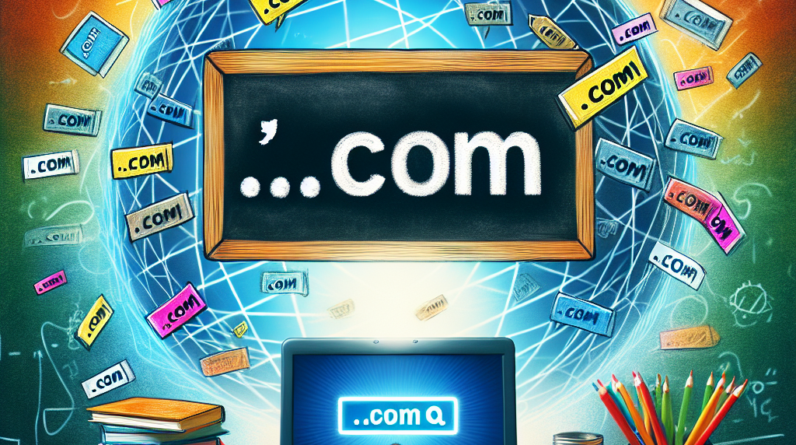
Have you ever wondered how people’s perceptions of trust and authority vary for websites with “.com” domains across different industries? The influence of a domain name on a website’s credibility and reputation cannot be understated, especially in today’s digital age. In this article, we will explore the fascinating differences in perceptions of trust and authority for “.com” domains, shedding light on how varying industries shape our perception of online legitimacy. Whether you’re a business owner or simply curious about the psychology behind website credibility, this article will provide valuable insights into the world of domain names and their impact on consumer trust.
Introduction
When it comes to online domains, one of the most common and widely recognized domain extensions is “.com.” As a website owner, the trust and authority your domain possesses can have a significant impact on the success of your online presence. In this article, we will explore the perceptions of trust and authority in .com domains across various industries. We will delve into the factors that influence these perceptions, the importance of trust and authority in consumer behavior, and strategies for enhancing trust and authority for your .com domain.
Perceptions of Trust in .com Domains
Factors affecting trust perceptions
Trust is crucial in establishing a positive online reputation and attracting potential customers. Numerous factors contribute to the trustworthiness of a .com domain. Firstly, the domain name itself plays a crucial role. A clear, concise, and memorable domain name can instill a sense of trust in visitors. Additionally, the website design, particularly its layout, color scheme, and overall aesthetic, can influence trust perceptions. A professional-looking website inspires confidence in visitors and reassures them that the business behind the domain is legitimate.
Trustworthiness of .com domains in general
.Com domains generally enjoy a higher level of trust compared to other domain extensions. This is due to the widespread popularity and familiarity of .com among internet users. Individuals have become accustomed to associating .com domains with credible and established businesses. As a result, simply having a .com extension can inherently boost the perception of trust for your domain.
Trust signals and indicators
Building trust can be facilitated by incorporating trust signals and indicators on your .com domain. These can include security features such as SSL certificates and trust badges from reputable organizations such as the Better Business Bureau. Displaying customer reviews, testimonials, and ratings also serves as social proof that can enhance the trustworthiness of your domain. When visitors see positive experiences from others, they are more likely to trust and engage with your business.

Perceptions of Authority in .com Domains
Factors affecting authority perceptions
Authority in a .com domain is closely tied to expertise, relevance, and credibility. The content on the website, including accurate and up-to-date information, contributes to its perceived authority. The reputation and credentials of the individuals or organizations behind the domain also play a significant role in establishing authority. Furthermore, the presence and engagement on social media platforms can influence the perceived authority of a .com domain.
Authority of .com domains in general
Similar to trust, .com domains benefit from a general perception of authority. Users tend to associate .com domains with established businesses that have likely accumulated knowledge and experience in their respective fields. This association provides a head start when it comes to establishing authority in a particular industry.
Authority indicators and signals
To strengthen the authority of your .com domain, it is essential to incorporate authority indicators and signals. Publishing high-quality and well-researched content that positions you as an expert in your industry is key. Including author bios, credentials, and links to relevant professional affiliations can further enhance the perceived authority of your domain. Collaborating with influencers or experts in your field and citing reputable sources can also bolster your domain’s authority.
Trust and Authority in Different Industries
E-commerce industry
In the e-commerce industry, trust is paramount for consumers to feel confident in making online purchases. Factors such as secure payment gateways, clear return policies, and transparent product information are essential for establishing trust. Authority can be built through showcasing industry expertise, providing detailed product descriptions, and featuring customer reviews.
Education industry
Trust in the education industry revolves around accreditation, certifications, and the reputation of educational institutions. Displaying recognized certifications and affiliations on a .com domain can instill trust in potential students. Authority can be further established by highlighting faculty credentials, showcasing student success stories, and featuring industry partnerships.
Healthcare industry
In the healthcare industry, trust is of utmost importance as users are often seeking reliable and accurate medical information. Trust can be built through providing authoritative and trustworthy medical content, displaying endorsements from reputable medical organizations, and featuring healthcare professionals’ credentials. Authority in this industry is closely tied to the expertise and experience of medical practitioners.
Financial industry
Trust and authority play a crucial role in the financial industry. Security measures such as encryption, secure transactions, and transparent privacy policies are vital for establishing trust in financial transactions. Authority can be built through showcasing industry certifications, featuring financial experts’ opinions and advice, and providing educational resources on topics such as budgeting and investing.
Travel industry
In the travel industry, trust is essential due to the often high financial investment associated with booking trips. Trust can be built through showcasing customer testimonials, featuring clear cancellation and refund policies, and providing detailed information about destinations and accommodations. Authority can be established through partnerships with reputable travel agencies, featuring content from travel experts, and highlighting awards or recognitions received.
Technology industry
In the technology industry, perceptions of trust and authority are built through delivering secure and reliable products or services. Transparent privacy policies, cybersecurity measures, and prompt customer support contribute to trust perceptions. An authoritative .com domain in this industry demonstrates expertise through featuring case studies, highlighting partnerships with leading technology companies, and providing comprehensive product guides.
Media and publishing industry
In the media and publishing industry, trust is closely tied to accurate and reliable information. Trust can be established through proper citations, fact-checking, and adherence to journalistic standards. Authority can be built by featuring contributions from renowned journalists or experts, showcasing awards or recognition received, and providing in-depth analysis and insights on relevant topics.
Food and beverage industry
In the food and beverage industry, trust is established through providing safe and high-quality products. Certifications and accreditations related to food safety and quality can enhance trust perceptions. Authority can be built by featuring endorsements from renowned chefs or nutritionists, creating engaging and informative content related to food and beverages, and showcasing partnerships with reputable suppliers.
Real estate industry
In the real estate industry, trust is vital due to the significant financial transactions involved. Trust can be built through clear and transparent property listings, providing accurate and up-to-date market information, and showcasing positive client testimonials. Authority can be established by featuring experienced real estate agents, highlighting successful past transactions, and providing valuable insights and advice on the real estate market.
Automotive industry
In the automotive industry, trust is established through providing reliable vehicles and services. Trust can be built through showcasing industry certifications, featuring customer reviews and ratings, and offering transparent warranty and service information. Authority can be established by featuring collaborations with reputable automotive manufacturers, providing comprehensive vehicle guides, and highlighting expertise in specific areas such as electric or luxury vehicles.

Factors Influencing Trust and Authority in Different Industries
Industry-specific trust signals
Each industry has its unique trust signals that resonate with its target audience. For example, online security features such as SSL certificates and encrypted payment gateways are crucial trust signals for e-commerce websites. On the other hand, professional accreditations and certifications from recognized industry bodies are significant trust signals in fields like finance and healthcare. Understanding the industry-specific trust signals and incorporating them into your .com domain can greatly enhance trust perceptions.
Importance of customer reviews and testimonials
Customer reviews and testimonials play a vital role in establishing trust and authority across industries. Positive reviews and testimonials serve as social proof, providing potential customers with reassurance that others have had a positive experience with your business. Encouraging customers to leave reviews and prominently featuring them on your .com domain can significantly influence trust and authority perceptions.
Relevance of certifications and accreditations
Certifications and accreditations specific to each industry contribute to trust and authority. These credentials demonstrate adherence to industry standards and best practices, reassuring visitors of the reliability and credibility of your .com domain. Investing in obtaining relevant certifications and accreditations can differentiate your business and establish a strong foundation of trust and authority.
Role of industry regulations and compliance
Industry regulations and compliance play a crucial role in building trust and authority. By ensuring compliance with applicable laws and regulations, your .com domain demonstrates a commitment to ethical business practices. Communicating your adherence to industry regulations and compliance on your website helps establish trust with visitors who value transparency and integrity.
Benchmarking against competitors
Comparing and benchmarking your .com domain against competitors can provide valuable insights into the trust and authority landscape within your industry. Analyzing what factors contribute to the trust and authority of your competitors’ websites can help you identify areas for improvement and implement strategies to enhance your own trust and authority perceptions.
Consistency in customer experience
Consistency in customer experience is crucial in building trust and authority. From the moment a visitor lands on your .com domain to completing a transaction or engaging with your business, providing a seamless and consistent experience is key. This includes ensuring consistent branding, messaging, and user experience across all touchpoints. Consistency builds trust and establishes your domain as a reliable, authoritative source within your industry.
Impact of Trust and Authority on Consumer Behavior
Consumer trust and purchase decisions
Consumer trust directly influences purchase decisions. When consumers trust a .com domain, they are more likely to make a purchase or engage with the business. Trustworthy domains inspire confidence, reduce perceived risks, and enhance the overall shopping experience. Therefore, establishing trust through your .com domain can have a positive impact on your business’s bottom line.
Role of authority in influencing consumer perceptions
Authority plays a significant role in shaping consumer perceptions. When a .com domain is perceived as authoritative, consumers view it as a reliable source of information, products, or services. Authority inspires credibility and positions your business as a trusted leader in your industry. This perception can influence consumers to choose your .com domain over competitors and solidify long-term relationships.
Trust and authority in online transactions
Trust and authority are particularly crucial when it comes to online transactions. Users are often required to share personal and financial information, making it essential for them to trust the .com domain they are interacting with. Authority can alleviate concerns about the legitimacy of the website and ensure that users’ data is handled securely. Building trust and authority are essential to fostering a safe and reliable online transaction environment.
Case Studies
Successful .com domain in a trust-driven industry
In the healthcare industry, a .com domain that has successfully established trust is HealthMatters.com. HealthMatters.com provides accurate and reliable medical information, backed by contributions from renowned healthcare professionals and organizations. The domain prominently displays certifications and affiliations, showcasing its adherence to industry standards. Through showcasing positive patient testimonials and featuring a user-friendly interface, HealthMatters.com has established itself as a trusted source for medical information and services.
Highly authoritative .com domain in a competitive industry
In the technology industry, TechGurus.com has become a highly authoritative .com domain. TechGurus.com regularly publishes in-depth articles and guides on the latest technological advancements, providing valuable insights for both tech enthusiasts and professionals. The domain collaborates with industry experts, citing their opinions and featuring interviews. By consistently producing relevant and well-researched content, TechGurus.com has established authority in the technology industry, attracting a large and engaged audience.
Building trust and authority for a new .com domain
When starting a new .com domain, building trust and authority can be challenging. However, through strategic efforts, it is possible to establish credibility. For example, a new educational platform, LearnSmart.com, can offer free educational resources, such as e-books and webinars, to build trust and showcase expertise. By featuring testimonials from early adopters and leveraging social media platforms to engage with the target audience, LearnSmart.com can gradually establish itself as a trusted and authoritative source in the education industry.
Strategies for Enhancing Trust and Authority in .com Domains
Establishing a strong online presence
Developing a strong online presence is vital for enhancing trust and authority. This includes optimizing your website for search engines, leveraging social media platforms, and utilizing content marketing strategies. By consistently delivering valuable and relevant content to your target audience, you can establish your .com domain as an authoritative source within your industry.
Improving website design and user experience
An intuitive and user-friendly website design is essential for building trust and authority. Ensure that your .com domain is easy to navigate, mobile-friendly, and visually appealing. Pay attention to factors such as page load speed, responsive design, and clear call-to-action buttons. A well-designed website enhances the overall user experience, inspiring trust and encouraging engagement.
Building relationships through content marketing
Content marketing is a powerful strategy for building trust and authority. Develop a content strategy that delivers valuable, informative, and engaging content to your audience. This can include blog posts, videos, podcasts, or infographics. By positioning your .com domain as a reliable source of industry knowledge, you can establish trust and authority amongst your target audience.
Ensuring security and privacy
Providing a secure and private browsing experience is crucial for building trust. Invest in robust security measures such as SSL certificates to encrypt sensitive data and protect user information. Communicate your commitment to security and privacy through clear privacy policies and terms of service. By prioritizing user safety, you can enhance trust perceptions and instill confidence in visitors to your .com domain.
Utilizing social proof
Social proof is a powerful tool for building trust. Showcase positive customer reviews and testimonials on your .com domain to provide evidence of your business’s reliability and customer satisfaction. Additionally, highlight endorsements from influencers or industry experts to further enhance trust and authority perceptions. By leveraging social proof, you can inspire confidence in potential customers and differentiate your .com domain from competitors.
Earning backlinks and mentions from reputable sources
Earning backlinks from reputable sources is another strategy for enhancing trust and authority. When reputable websites link back to your .com domain, it signals to search engines and visitors that your website is a reliable and authoritative source. Actively seek opportunities to collaborate with industry influencers, contribute guest posts, or participate in interviews to earn quality backlinks and mentions.
Providing exceptional customer service
Exceptional customer service is a crucial aspect of building trust and authority. Respond promptly and professionally to customer inquiries, address concerns and complaints with empathy, and go above and beyond to meet customer needs. By providing a positive customer experience, you can establish a reputation for trustworthiness and inspire loyalty amongst your customers.
The Future of Trust and Authority in .com Domains
Emerging trust and authority factors
As technology and consumer expectations evolve, new factors will emerge that influence perceptions of trust and authority in .com domains. This may include emerging technologies such as blockchain for ensuring transparent transactions, AI-powered chatbots for personalized customer interactions, and voice search optimization for enhanced user experiences. Keeping abreast of these emerging factors and incorporating them into your .com domain strategy will be crucial in maintaining trust and authority in the future.
Role of artificial intelligence and machine learning
Artificial intelligence (AI) and machine learning will likely play an increasingly significant role in assessing trust and authority in .com domains. These technologies can help analyze user behavior, identify patterns, and predict user preferences, enabling businesses to tailor their websites and content to build trust and authority more effectively. Incorporating AI and machine learning into your .com domain strategy can provide valuable insights and aid in building a more personalized user experience.
The influence of user-generated content and social media
User-generated content and social media will continue to shape trust and authority perceptions in .com domains. Consumers place high value on the opinions and experiences of their peers. Encouraging and showcasing user-generated content such as reviews, testimonials, and social media mentions can significantly impact trust and authority perceptions. Investing in social media marketing and engagement will also be crucial in building trust and staying connected with your audience.
Conclusion
Trust and authority are essential elements for the success of any .com domain across various industries. By understanding the factors that influence these perceptions, businesses can strategically enhance trust and authority to attract and retain customers. Through strategies like establishing a strong online presence, providing exceptional customer service, and leveraging social proof, .com domains can inspire confidence and establish themselves as credible and authoritative sources. As the digital landscape evolves, it is important for businesses to adapt and embrace emerging technologies and trends to stay ahead and maintain trust and authority in their .com domains.







